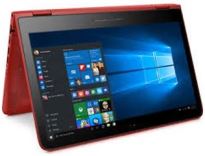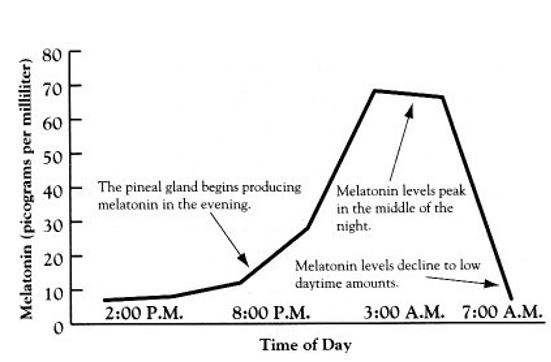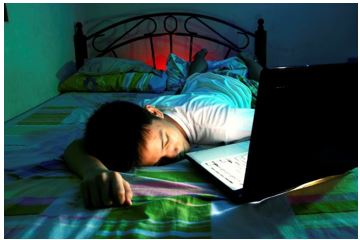Blog Post No. 57
24th March 2018
Copyright © Renata Taylor-Byrne 2018
Renata’s Coaching Blog: Why you should be concerned about ‘blue light’ at night, and the quality of your sleep
~~~
Introduction

New electronic gadgets can be really appealing and very attractive and efficient, and many people can be influenced into buying them, without being fully aware that the price tag for the gadget might be more than financial. There may be a physical cost too.
Research experiments in this area can be very helpful. They can help us to sort out what is really beneficial for people’s health and well-being, and what works against their best interests. However, experience of vested interests teaches us that we’re not going to get this information easily.
As part of the research I’m doing at the moment, for a book on the importance of sleep, I came across the details of an experiment into the negative effects (on the human body-brain-mind) of using iPads and other electronic devices that involve LED lights, (such as mobile phones, and lap top computers). And I thought our readers might find it interesting. (LED stands for Light Emitting Diodes. A light-emitting diode is a special kind of electronic device that glows when electricity passes through it. They are commonly used to illuminate computer screens, iPads, iPhones, etc.)
In this blog I’m going to:
(a) outline the results of an experiment into the effect of the particular kind of light emitted by electronic devices;
(b) and describe the negative effects they can have on your body-brain-mind.
Using LED lights and getting a decent night’s sleep
Making sure we get a decent night’s sleep is an essential part of preparing for work, school, college, or any other activity that requires physical and mental energy. And it’s essential for physical and mental health.
 LED’s begin their popular life in 2014. In that year, a Nobel Prize in Physics was awarded to the three creators of LEDs: Shuji Nakamura; Isamu Akasaki; and Hiroshi Amano. They got this award because they were responsible for the creation of blue, light-emitting diodes which were described as: “Monumental energy-saving lighting technology”.
LED’s begin their popular life in 2014. In that year, a Nobel Prize in Physics was awarded to the three creators of LEDs: Shuji Nakamura; Isamu Akasaki; and Hiroshi Amano. They got this award because they were responsible for the creation of blue, light-emitting diodes which were described as: “Monumental energy-saving lighting technology”.
These LED lights use less energy than normal light bulbs and therefore they have a longer life span. “But they may be inadvertently shortening our own (life)”, is the opinion of Matthew Walker (2017)[1].
The blue light, which is emitted by the LED lights, is very powerful (twice as powerful as an ordinary light bulb). And it is twice as powerful at inhibiting the release of melatonin in our bodies-brain in the evening (which is essential for sleep). Most people may not be aware that they are making it difficult to sleep by using these devices at night.
 Let’s look at melatonin. I want to explain why melatonin is very important to us: it’s described as the ‘hormone of darkness’, and it increases in volume at dusk or during the early evening.
Let’s look at melatonin. I want to explain why melatonin is very important to us: it’s described as the ‘hormone of darkness’, and it increases in volume at dusk or during the early evening.
Its release within our bodies is governed by a piece of our brain called the ‘suprachiasmatic nucleus’ which simply means ‘the 24 hour clock within our brain’; and under the orders from this nucleus in our brains, melatonin is released into the bloodstream via the pineal gland, which is located deep in the brain.
Melatonin gives a very powerful chemical message to the body and the brain, that sleep will be coming soon. Melatonin in itself doesn’t bring about sleep, but it signals to the brain regions that do generate sleep that sleep must be started.
Then, when sleep is underway, melatonin slowly reduces in strength during the night and into the early morning. Melatonin release is finally stopped when the pineal gland, which had been releasing it, switches the hormone off as the dawn light shines through the bedroom window.
As human beings, we have a sensitivity to blue LED lights. This sensitivity within us, causes a health problem. For example: Four researchers, Anne-Marie Chang, Daniel Aeschbach, Jeanne F. Duffy and Charles A. Czeisler, decided to find out what the effect of our sensitivity to LED light has on the ability of people to get a good night’s sleep, if any.
Reading and using an iPad before bedtime – a comparison
Here’s the evidence of the effects of LED light on people’s sleep:
A research experiment was conducted in 2014, in which the four researchers, mentioned above, got together a group of adults who didn’t have any health problems, and these adults took part in 2 different processes – two different experimental conditions.
Each of the participants experienced these two processes:
Initially, they had five nights of reading a book on an iPad for two hours before bed (and they weren’t allowed any other activities like going on the internet and/or checking their emails).
Subsequently, the participants also had five nights reading a paper book for several hours before bed.
And to increase the validity of the experiment, some people experienced the book reading process first, and some people started by reading the iPad first.
The experiment lasted for two weeks in a tightly-controlled laboratory experiment.
What the researchers found
The result of reading on an iPad before going to sleep, as compared to reading a book, held back the release of melatonin by over 50% at night.
This meant that there was a delayed release of melatonin (the hormone that pressurizes the body into sleeping) by up to three hours. Consequently, their melatonin didn’t arrive until early in the morning.
This meant that, (compared with the time it took for them to fall asleep when they were reading a paper book), under the iPad condition, it took them longer to get some sleep. And also it was discovered that there were three specific differences in the quality of the sleep when the results of the two processes were compared.
Firstly, because of the delayed onset of sleep as a result of reading the iPad, the participants felt sleepier and had less energy the following day.
Secondly, the iPad reading had the effect, for a few days after the experiment, of delaying the release of melatonin by 90 minutes, so they took longer to fall asleep for those subsequent nights.
This resulting delay in the release of melatonin showed that the blue LED light had the power to delay the onset of our normal sleep rhythms. (These rhythms of sleep and wakefulness, which are known as circadian rhythms, are very powerful, internal, biological regulators of our body temperature, sleep-wake cycle, hormone release, eating habits and other body functions).
Thirdly, the iPad use affected their sleep and reduced their rapid eye movement sleep (REM) sleep, which is vital for brain repair and regeneration.
The researchers, (whose experiment can be found by clicking on the live link below, in the references list[2]), came to the following conclusion:
“Overall, we found that the use of portable light-emitting devices immediately before bedtime has biological effects that may perpetuate sleep deficiency and disrupt circadian rhythms, both of which can have adverse impacts on performance, health, and safety.”
‘Smart Kids don’t take their phone to bed’
 According to an article that appeared in the Sunday Times on October 1st, 2017, entitled, ‘Smart Kids don’t take their phone to bed’ (page 14), there are details of a survey undertaken by the Children’s Sleep Charity, in which children reported keeping their mobiles under their pillows for fear of ‘missing something’. By doing this they would be more likely to hear that a message had been sent to them and they could then check their phone.
According to an article that appeared in the Sunday Times on October 1st, 2017, entitled, ‘Smart Kids don’t take their phone to bed’ (page 14), there are details of a survey undertaken by the Children’s Sleep Charity, in which children reported keeping their mobiles under their pillows for fear of ‘missing something’. By doing this they would be more likely to hear that a message had been sent to them and they could then check their phone.
The evidence from the research study I described above, has shown the full, negative impact of blue LED light when it was viewed by research participants at night-time. From that, we may be able to see that the children who take their phones and other devices to bed will be exposed to blue LED light, which will impact on the ability of the children to get a decent night’s sleep.
Conclusion
The popular public reaction to the creation of LED light was very enthusiastic, wasn’t it? It was described as: “A monumental energy-saving lighting technology”, and the creators obtained a Nobel Prize in Physics.
Maybe it wasn’t such a great idea after all! Please be aware of the biological effects of this light on yourself and your loved ones. A good night’s sleep is important not only for energy the next day; and for good physical health; but also for good mental health and efficient and effective brain functioning.
Best wishes,
Renata
Renata Taylor-Byrne
Lifestyle Coach-Counsellor
The Coaching/Counselling Division
Email: renata@abc-counselling.org
Telephone: 01422 843 629
~~~
References:
[1] “Why We Sleep“, by Matthew Walker (2017), Allen Lane Publishers.
[2] Anne-Marie Chang, Daniel Aeschbach, Jeanne F. Duffy and Charles A. Czeisler (2015) Evening use of light-emitting eReaders negatively affects sleep, circadian timing, and next-morning alertness.
PNAS January 27, 2015. 112 (4) 1232-1237; published ahead of print December 22, 2014. https://doi.org/10.1073/pnas.1418490112
